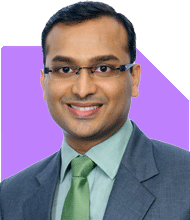Dr Rahul Baxi | Answer |Ask -Follow
Diabetologist - Answered on Jun 08, 2023
He specialises in the management of diabetes, diabetes prevention, diagnosis, management and remission. He consults patients in Mumbai and online via video and telephonic calls.
Dr Baxi has a master’s degree in general medicine from Nagpur University and a diploma in medicine from the Academy of Medicine, Singapore. He has a post-doctoral fellowship in diabetes from CMC, Vellore, and has completed his MBBS from the Maharashtra University of Health Sciences, Nashik.... more

I am 58 year old male and very much active.Three months back my HbA1c was recorded at 8.8 my doctor presccribed Glycomet GP3/850 before BF and Dapasech-S(10/100) after dinner. I regularly measure Glucose level on Glucometer and I find both PP and FBS well within range even after taking sweets at times. Am I taking too much medicine?
You may like to see similar questions and answers below
Dr Rahul Baxi | Answer |Ask -Follow
Diabetologist - Answered on Apr 28, 2023
Dr Karthiyayini Mahadevan | Answer |Ask -Follow
General Physician - Answered on Jun 16, 2024
Ramalingam Kalirajan |10893 Answers |Ask -Follow
Mutual Funds, Financial Planning Expert - Answered on Dec 15, 2025
Ramalingam Kalirajan |10893 Answers |Ask -Follow
Mutual Funds, Financial Planning Expert - Answered on Dec 15, 2025
Radheshyam Zanwar |6746 Answers |Ask -Follow
MHT-CET, IIT-JEE, NEET-UG Expert - Answered on Dec 15, 2025
Ramalingam Kalirajan |10893 Answers |Ask -Follow
Mutual Funds, Financial Planning Expert - Answered on Dec 15, 2025
Ramalingam Kalirajan |10893 Answers |Ask -Follow
Mutual Funds, Financial Planning Expert - Answered on Dec 15, 2025
Ramalingam Kalirajan |10893 Answers |Ask -Follow
Mutual Funds, Financial Planning Expert - Answered on Dec 15, 2025
Samraat Jadhav |2508 Answers |Ask -Follow
Stock Market Expert - Answered on Dec 15, 2025
Ramalingam Kalirajan |10893 Answers |Ask -Follow
Mutual Funds, Financial Planning Expert - Answered on Dec 15, 2025
Reetika Sharma |425 Answers |Ask -Follow
Financial Planner, MF and Insurance Expert - Answered on Dec 15, 2025
Radheshyam Zanwar |6746 Answers |Ask -Follow
MHT-CET, IIT-JEE, NEET-UG Expert - Answered on Dec 15, 2025

























